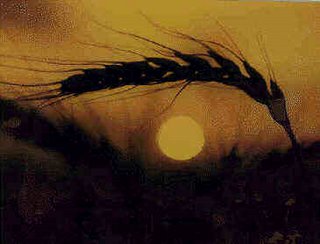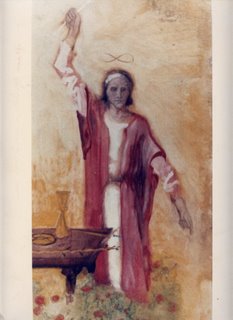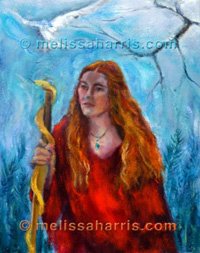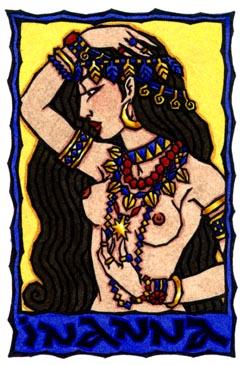
I didn't plan to usher in Lughnasad in my hot kitchen at midnight, wrestling with a chicken.
Take and eat... The chicken grew up healthily, running around on a farm near here. I hope she had a good chicken-life. Goddess knows most of her sisters don't. If Pagans talked about sin, then I would say that the way we treat other animals is one of our gravest sins.
This is my body...For 11 years I was a vegetarian for ethical reasons. Meat wasn't necessary to sustain life, I reasoned, and so it was wrong to kill for matters of convenience or taste. Furthermore, the meat industry is cruel to animals - human and non-human - and to earth, polluting, poisoning, and otherwise squandering natural resources.
A few things happened to change my diet. Addicted to sugar, I visited a nutritionst who told me to start by doubling my protein intake. Then my sister was diagnosed with breast cancer, and all the soy protein I was eating became
verboten. And I read a remarkable book by
Kathryn Paxton George, who argues that the vegan ideal is sexist, racist, ageist, and classist - that it relegates all but the most robust, healthy, privileged to a position of moral inferiority.
Given for you... To live in accord – that, I believe, is a key Pagan value. We seek to find and honor our place on the earth and in the family of beings. The dominant culture doesn’t honor this ideal in the least. Our treatment of animals makes this clear. It’s an enormous violation to raise animals for food in factory farms, and in numbers to support the fast food industry. The animals suffer, the people working in the meat industry suffer, the earth suffers, and we suffer because we consume them. We create, full-cloth, a cycle of suffering as only human beings can.
When you do this...
To live in accord, and to eat meat, means to eat animals that were raised locally and humanely. Kathryn Paxton George argues persuasively that many people need meat in their diets. She also defends ethical, aesthetic semi-vegetarianism – eating meat and plants grown locally and healthfully, in moderation, and taking pleasure in food. Being closer to the source of my food makes it more difficult to deny what I’m doing when I eat an animal. I become more intimate with the cycles of life and death. And because I love my dog so deeply, and think every day about what it means to give him a good life, I also think about what it means for other animals to have a good life.
Remember...
Beings and plants die so that you and I can live and flourish. This is one of the mysteries, and it’s difficult to face. We must take care not to pervert or deny the cycles of life and death - whether by killing people in war or labor, polluting rivers and seas, taking more than we need. Indeed, given what humans have wrought, we have a special responsibility to heal the cycles. Witches and other Pagans may have a special role to play. Our spiritual values place us in a position to articulate much-needed visions for healing. The work that Common Ground is doing in Louisiana seems to me a perfect example of Pagan vision and action.
Remember me...
The earth provides everything we need, including death. She recycles and renews, provides our breath, food, water, and endless inspiration. At Lughnasad we’re still in the height of the growing season, but we harvest the first grains, taking life, to sustain us through the winter. Thus does death come in the midst of life.
And remember yourself...
I stayed up late on a hot night to roast a chicken so I could eat good protein this week. I thanked that chicken as I prepared it for the oven and as I tore the cooked flesh from its bones; I thanked it for providing its life so I could eat. It’s a complex thing; I’m not convinced I deserve that chicken’s life, though I need it. I saved the bones for soup stock and the pan drippings for my dog. I wanted to take that life consciously, in as full an awareness as I could muster, and use every bit of the gift. On this, the first of our harvest festivals, let us give thanks for She who provides and vow to honor Her ways to the best of our abilities. So mote it be.
 Sound crazy?
Sound crazy?








